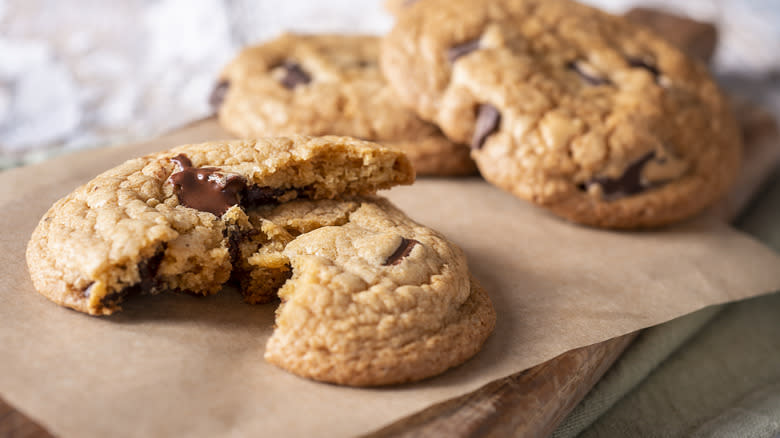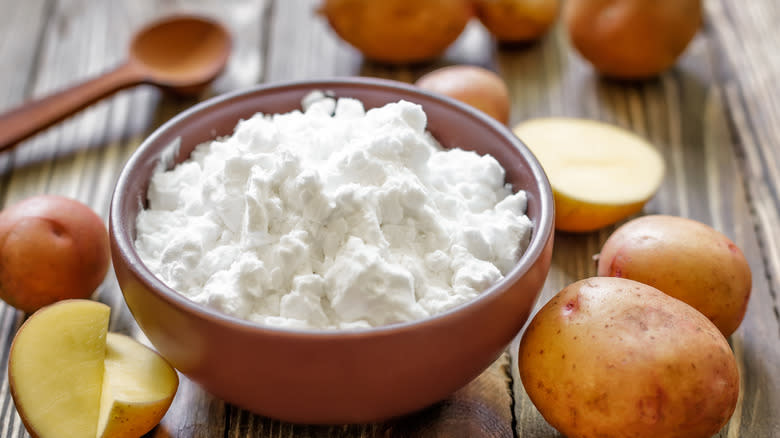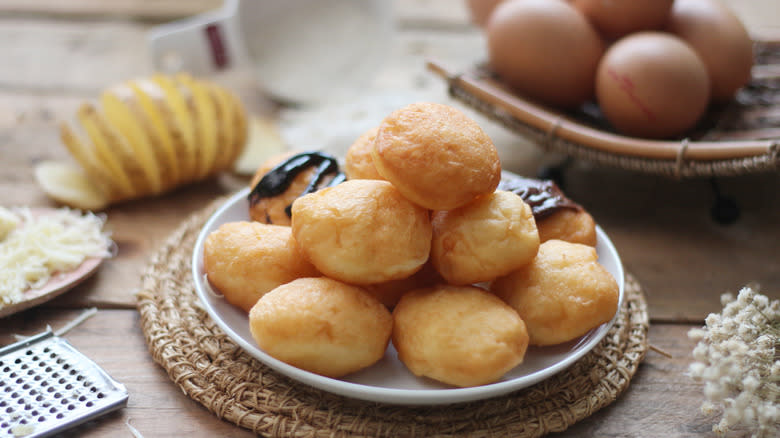Potato: The Unexpected Ingredient For Super Soft Cookies

We may receive a commission on purchases made from links.
A great debate in the confectionary world comes down to cookie consistency. Is your preference for crisp, crumbly, snap-tastic bites, or would you rather yours be a soft and chewy delight? While there's no right or wrong answer to this age-old conundrum, there is a surprising solution to achieving supreme softness for the latter option. Next time you assemble your treat-making mise en place, reach for a less-expected ingredient: potato.
Believe it or not, potatoes bring some excellent qualities to sweet applications. These tubers help baked goods retain moisture and ensure a fluffy, tender crumb. This means you can achieve a pillowy cookie that is softer than what you will get with a standard recipe. Yet, while there is great reason to take your potato from the dinner table to the dessert buffet, not all potato options are created equal.
There are three common ways to incorporate this root into a baking project: potato flour, potato starch, and good old-fashioned mashed potatoes. And each has its own particular qualities. Potato flour comes from potatoes that are dehydrated and then pulverized. Because this powder is basically the potato in its entirety, it contains all the proteins and fibers therein. Potato starch is a bit more versatile, particularly in cookie-making. The starch is extracted by crushing raw potatoes, then drying the liquid starch that separates until it becomes powdered into a product all on its own.
Read more: 8 Baking Sheet Mistakes You Want To Avoid
Baking With Potato Flour And Potato Starch

Potato flour offers a great way to add tenderness to baked goods and is often used for breads like potato rolls. One drawback, however, is that it also maintains some potato flavor. Potato flour can be substituted for all-purpose or whole wheat flour, as well as rice or oat flour. But bear in mind that this flour has a higher moisture content and yields a sticky finished product, so it's advisable to blend potato flour with another type of flour.
While potato starch doesn't boast the same nutritional value as potato flour, when it comes to baking it has the advantage staying neutral, meaning it does not contribute to or alter the flavor or color of the end product. Potato starch doesn't develop a tough network of proteins, either, which helps keep baked goods extra soft. Furthermore, it retains moisture more effectively and helps prevent staleness, so your sweets will last a little longer.
Though cornstarch and potato starch don't behave exactly the same way, it's possible to use the guidelines for baking with cornstarch, since they can generally be substituted in a one-to-one ratio. It's usually recommended to add about ½ to 1 teaspoon of cornstarch per cup of flour, and because potato starch can be an even swap, that's a good place to start. From there, you can experiment by adjusting the ratio to get your desired consistency.
Baking With Mashed Potatoes

Potato starch and potato flour may be the more convenient options, but it's also possible to bake with straight-up mashed potatoes if you're looking to bring moisture to your favorite snacks. (And what better way to use up leftover mashed potatoes?) This was a strategy born from necessity during World War II when shortages of classic baking ingredients were common, and today you can easily find recipes for mashed potato cookie variations.
Substituting mashed potatoes for flour is a bit tricky due to the moisture content. For every ¼ cup of flour, you'll want ¾ cup of mashed potato, and then reduce additional liquid in the recipe by about half. This is a suggested starting point, and you can add liquid or more flour to adjust as you go until you achieve your desired consistency.
Today's inventive culinary minds have managed to utilize the spud's superpowers in lots of creative ways. Potato donuts, made with mashed potatoes, are a fun addition to your at-home repertoire. Classic cakes benefit from the potato treatment, too, and the mild flavor won't interfere with a dose of baking cacao in a moist, fluffy chocolate slice.
Read the original article on Daily Meal.

